Marketers love talking about whether things are “dead.” I guess this is what happens when you work in an industry that moves at the speed of light.
“Is SEO dead? Is email marketing dead? Is blogging dead?” I’ve been hearing all of this since 2014 and I’m sick of it. It’s all a bit morbid. But I guess I’m also feeding into it by writing about this stuff.
The latest one I’ve been hearing is, “Are hashtags dead?”
The short answer is, it depends on the platform. Let’s go through some of the most common platforms and my observations on where you can still use hashtags and where you should hold back.
Are hashtags still relevant on Instagram?
Instagram is tricky. Hashtags used to be the main way to find content on Instagram, and now you can get shadowbanned if you use too many hashtags or the same ones over and over again. You can also get banned if you use one of the hashtags on their mysterious list of banned hashtags.
Instagram has recommended you use 3-5 hastags per post. Gone are the days when you could get away with spamming your captions with the same 30 hashtags over and over again.
Lately, we’ve been experimenting with just putting some keywords at the bottom and have seen some movement. The format looks like this: Keyword 1 | Keyword 2 | Keyword 3
Try to incorporate relevant keywords into your caption, and keep the focus on making sure your content is engaging. The Explore page feeds people content similar to the stuff they’re already consuming on the app, rather than prioritizing the discovery of content hashtags.
Think about it: do YOU search for hashtags on Instagram? I personally can’t remember the last time I did so.
Are hashtags still relevant on Facebook/Meta?
I wouldn’t recommend using hashtags on Facebook as they just look spammy here. Facebook gives you around 63,000 characters per post, so use what you need to in order to build keywords into your post.
This strategy gives Google something to look at (rather than hashtags) and gives you a better chance of your content coming up in Google Search.
If you absolutely want to use hashtags, use the same guideline as their sister company Instagram and stick to 3-5 per post.
Are hashtags still relevant on Twitter/X?
(How many of these platforms will change their names again over the next few years?)
Elon Musk has said that he hates hashtags and that the algorithm no longer uses them. However, I find that the “Explore” section of X still picks them up sometimes. Because of the fast-paced nature of this platform, I’d suggest staying away from general hashtags and jumping on trending ones (where relevant) if you’d like to try giving your content a boost.
Keep a close eye on this one, as things can change at the owner’s whim—I wouldn’t be surprised if X started banning users who put hashtags in their posts.
Are hashtags still relevant on LinkedIn?
For LinkedIn, I would prioritize building keywords into your posts, just as you would with a blog post or a page on your website.
I just performed a search for the hashtag #business on LinkedIn and it showed me some posts where that hashtag was used, but others where just the keyword was used throughout the post, so the algorithm is definitely picking up on keywords and not prioritizing hashtags.
With that said, I feel like throwing a few relevant, specific hashtags at the bottom shouldn’t cause too much trouble. LinkedIn is a little bit behind all of these other platforms, so the hashtag-hate is a bit behind here as well. I’d guess that you still have a few years of hashtag bliss on LinkedIn.
Are hashtags still relevant on TikTok?
TikTok is one of the few platforms where I feel that the almighty feared-yet-beloved hashtag can still make or break the discoverability of your content. The #fyp and associated hashtags can still catapult your content to people’s For You Page as long as the content is good enough and the algorithm gods want to bless you.
To wrap up, are hashtags still relevant? The answer is yes, sometimes—but with a strategic approach. Don’t overdo it on one of these platform. Instead, pick 3-5 that are highly relevant to your content, audience, and goals.
Most importantly, remember that no amount of hashtags will ever save bad content. Focus on creating high-quality, engaging posts first, then use hashtags as a tool to amplify your reach—not as a crutch.

